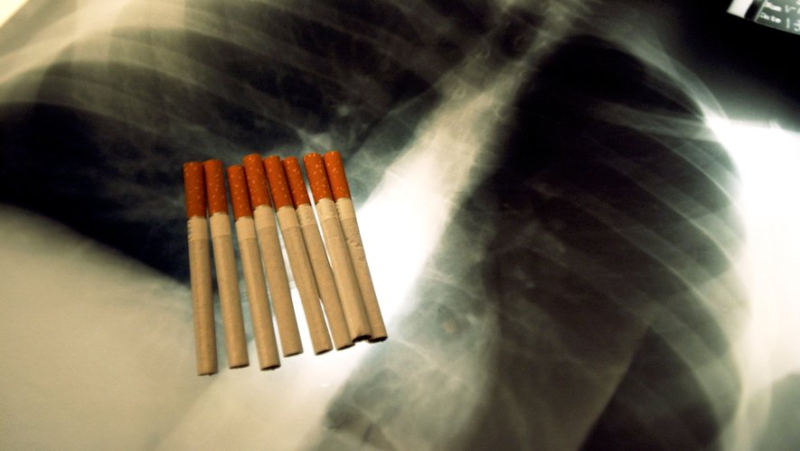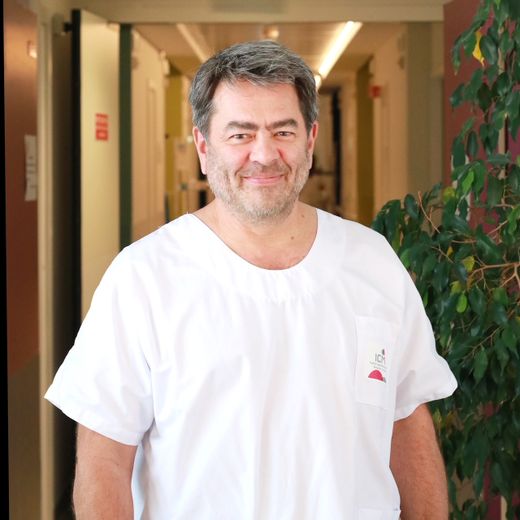Lung cancer: should we really believe in the treatment revolution announced at the Chicago world summit ?

Le cancer du poumon dit “à petites cellules” touche les fumeurs. Midi Libre – FRANCK VALENTIN
The congress of the American Society of Clinical Oncology (Asco), which brings together 35,000 oncologists in Chicago, in the United States, until Tuesday June 4, has raised great hopes in the management of thoracic cancers, two promising studies were presented on Sunday. Head of thoracic oncology at the ICM in Montpellier, Xavier Quantin is more cautious.
The annual congress in Chicago, the world summit for oncology, which brings together 35,000 oncologists until Tuesday in the United States, opens the way to a revolution in management of lung cancer ?
Two studies on so-called “small cell” cancer, which affects smokers, and on cancers linked to EGFR genetic mutation, have raised great hopes since their presentation on Sunday. the sick.
What are we talking about? Hope comes from immunotherapy (a treatment which consists of "teaching" organisms to fight against cancer) which reduces the risk of death by 27% in patients suffering from “small cell” cancer, and more than one in two patients (56% ;nbsp;%) is alive three years after diagnosis, compared to 47% so far.
Hope also comes from targeted therapy administered to patients who develop lung cancer attributed to a genetic mutation (EGFR), undoubtedly in a context of air pollution, according to current studies: patients who receive this treatment, added to radiotherapy-chemotherapy protocols, will not have a recurrence in 65% of cases, compared to 12% until now.
The cancer of Florent Pagny
Head of thoracic oncology at the ICM in Montpellier, Xavier Quantin remains extremely cautious.

Xavier Quantin remains cautious. PHOTO DR ICM
"The research presented on small cell cancers is a copy of a treatment strategy that has been applied for years for non-small cell lung cancer" (NSCLC, the most common, it represents 85% to 90% of lung cancers), indicates Dr Quantin. "Until now, in small cell cancer, immunotherapy was only indicated in metastatic forms of cancer", calls the doctor back.
He nevertheless agrees: extended to patients with local forms of small cell cancer, adjuvant immunotherapy to chemotherapy and radiotherapy "significantly reduces the risk of recurrence". A revolution ? The Montpellier resident hesitates : "These small cell cancers only affect 10% of patients. And localized forms are 20% of the 10%. For these people, yes, it is a step forward, especially since these are treatments that we know well and are used to mastering. But it is not a transformation of the approach to bronchial cancer either.
According to the Inca (National Cancer Institute), small cell cancer affects 2000 patients per year, it is in particular that which affects the singer Florent Pagny. The third most common cancer, lung cancer is the leading cause of cancer deaths in France with more than 33,000 deaths. The five-year survival rate "increases but remains bad", says the Inca.
"EGFR mutated patients, it's been a while since I’s seen one"
On lung cancers linked to the EGFR mutation, "the Chicago congress has already announced to us, last year, progress likely to transform the prognosis", recalls Xavier Quantin, doubtful.
This year, the LAURA study is testing the interest of osimertinib, a targeted therapy with a drug & ;quot;tyrosine kinase inhibitor type". "Yes, the risk of relapse decreases considerably", underlines Xavier Quantin.
He adds:"We have used Tagrisso (Editor's note: non-commercial osimertinib) in routine practice for years, in the first line, in a metastatic situation, in these patients. This isn’t really new. Last year, Asco presented the results of a study in patients who received the molecule after surgery, there was a benefit. We are on the same medication, but after radio and chemotherapy, on locally advanced, non-metastatic disease.
"In the marketing authorization, the use of osimertinib is today limited, but the results of the study will quickly change practices", predicts Xavier Quantin, who recalls that for these EGFR lung cancers, we also speak of " ;rsquo;a limited number of patients" : "mutated EFGR patients who are given concomitant radio-chemotherapy, it's been a while since I've seen one, it's going to concern very few patients as far as we're concerned", specifies the doctor.
Antibodies that transport chemotherapy molecules
For him, "we cannot say that there is today a revolution in the management of lung cancer& quot;, based on these studies: "It's not like when immunotherapy came along. We are expanding the use of drugs that already exist.
On the other hand, Dr Quantin reports "other expectations regarding other interesting therapeutic advances"< /em>:“We are continuing research on immunotherapy with other drugs, we are working on so-called bispecific antibodies, that is to say, which can target two targets at the same time, we have antibodies which allow chemotherapy to be transported, we also have antibodies which will attract lymphocytes where they are needed, vaccine studies will resume… There are a lot of development options in development right now".
"Things have really changed", confirms the oncologist: "Today, among inoperable patients, 80% are alive at five years. A few years ago, it was four times less".
"10% of patients followed at the ICM" are included in a research protocol. "There is not one solution, there are many, we must draw on the best".
I subscribe to read the rest




